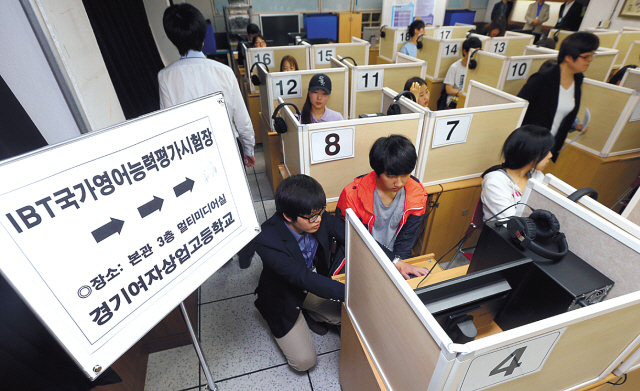교육부가 고등학생용 국가영어능력평가시험(NEA T)을 대학수학능력시험과 연계시키지 않기로 함에 따라 수백억원의 재정을 투입해 개발한 NEAT가 좌초될 위기에 놓였다.
28일 국회 교육문화체육관광위원회 소속 민주당 유기홍 의원실에 따르면 지난 정부는 해외 영어 시험 의존도를 낮춘다며 NEAT 개발•운영에 들어가 2008∼2013년 총 563억원의 예산을 투입했다.
유 의원실은 이 예산은 모두 국고 일반회계와 특별교부금으로 집행됐으며 2013년 한 해만도 169억원의 예산이 집행되고 있다고 지적했다.
유 의원은 “교육부가 이명박 정부의 공약사업으로 시행해온 NEAT가 교육부의 계 륵 사업이 됐다”며 “교육부가 NEAT를 대입에 연계하지 않기로 한 것에 대한 피해는 고스란히 학생과 학부모의 몫이며, 정책 비일관성의 표본이 NEAT 정책”이라고 비판했다.
이어 2008년부터 지금까지 NEAT에 응시한 사람은 성인용인 1급에 4천572명, 고교생용인 2급(기초학술영어)과 3급(실용영어) 응시자가 6만9천197명 등 7만3천69명이지만, “이들은 헛돈 낭비, 노력 낭비를 한 셈”이라고 유 의원은 지적했다.
국회 예산결산특별위도 2008∼2012년간 고교생용인 NEAT 2•3급에 들어간 예산이 371억4천600만원이지만 응시자수가 너무 적다고 지적하는 보고서를 내놓았다.
예결특위는 “교육부가 영어교육을 위한 교실과 시험장 등 교육인프라 확보계획, 영어 공교육 강화를 위한 교사의 자질 향상과 인원 확보 계획 등을 제대로 마련하지 않은 상황에서 수능 대체 가능성을 발표해 일어난 일”이라고 비판했다.
교육부는 수능의 외국어(영어) 영역을 NEAT로 대체할지를 지난해 말 결정하겠다 고 하고서 결정을 미루다가 지난 27일 대입제도 개선안 발표 때 수능과 연계하지 않 겠다고 밝혔다.
수험생 60만명을 대상으로 오류없이 시험을 진행하는 것이 물리적으로 어렵고, NEAT란 새로운 시험이 도입되면 사교육을 유발할 가능성도 있다는 것이 교육부가 내 세운 이유다.
고교생용 NEAT 2•3급은 2013학년도 대입이 치러진 지난해 처음 시범 시행돼 7개 대학이 활용했다. 2014학년도 대입에서는 NEAT 2•3급 시험 점수를 활용하는 대학이 36개(4년제 27개, 전문대 9개)다.
교육부는 올해 NEAT 2•3급 응시자가 6월2일과 7월28일 두차례 시험 중 좋은 점 수를 골라 활용할 수 있게 했으나 6월 시험에서 무더기 전산오류가 발생해 말썽을 빚었다.
토익과 토플 등을 대체하기 위해 만들어진 성인 대상 시험인 NEAT 1급도 상황은 비슷하다.
1급 시험의 회당 평균 응시인원은 지난해 444명, 올해 6월말까지는 592명에 불 과했다. 지난해 기준으로 토익과 토플 응시자 수와 비교하면 NEAT 응시자수(2•3급 포함)는 0.08%에 불과하다.
교육부는 이에 대해 하반기 중으로 NEAT를 활용할 방안을 강구하고 있다고 밝혔 다.
NEAT로 학생들의 영어수준을 진단하거나 NEAT 문제유형을 제공해 교사가 학생들 에게 가르칠 수 있게 하는 방안 등이 검토되고 있다.
교육부 관계자는 “수능과 연계하지 않기로 했지만 그동안 갖춘 기본 인프라와 개발 노하우는 그대로 남아 있다”며 “초•중등 학생들의 학습에 도움이 되는 방안을 하반기 중으로 마련할 계획”이라고 말했다.
<관련 영문 기사>
Ministry mulls over new state English test
Questions are mounting over a new state-administered English proficiency test as the government is reversing its plan to use it for college admission.
The government initially sought to substitute the National English Ability Test for the English section of the College Scholastic Ability Test from 2016.
But the Ministry of Education announced Tuesday it decided to abandon the plan due to systemic problems and concerns about rising private education costs.
“We realized that it is technically impossible to have some 600,000 students to take the NEAT on the same day, and realized it may drive more students to private education,” Education Minister Seo Nam-soo said Tuesday.
The ministry insisted it currently has no plan to abolish the test it developed at a cost of 42.5 billion won ($38 million) over the past four years. But critics expect the NEAT is likely to become a “useless test” that no students will take.
Currently, only 36 colleges nationwide have pledged to accept NEAT scores for admitting new students, while the majority of schools are still skeptical about using it.
The NEAT consists of tests on listening, reading, speaking and writing, unlike the current college entrance exam that only assesses reading and listening.
The aim of introducing the NEAT was to enhance practical and communicative English education. But teachers cite concerns about the lack of programs and teaching materials to prepare students; parents worry that it may increase students’ demand for private education.
The government was also hoping to reduce the country’s high dependence on foreign English proficiency tests, such as TOEIC and TOEFL.
But the number of applicants so far is well below the ministry’s expectations, with only 545 students taking the test in May.
“Although the NEAT is not used for college admission, we will continue to use the know-how and the contents we developed. We’ll discuss the possible ways to use the test and will make an announcement before this fall,” Yoo Jung-ki, head of the English department at the Education Ministry, told The Korea Herald.
By Oh Kyu-wook
(
596story@heraldcorp.com)








![[Today’s K-pop] Blackpink’s Jennie, Lisa invited to Coachella as solo acts](http://res.heraldm.com/phpwas/restmb_idxmake.php?idx=644&simg=/content/image/2024/11/21/20241121050099_0.jpg)